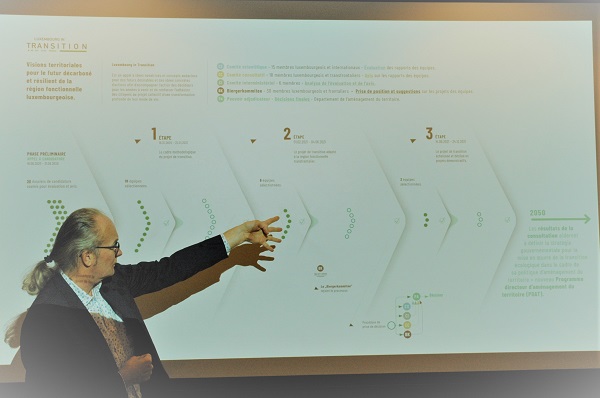 Claude Turmes, Luxembourg's Minister of Spatial Planning;
Credit: MEA, DATer
Claude Turmes, Luxembourg's Minister of Spatial Planning;
Credit: MEA, DATer
The Department of Spatial Planning of Luxembourg's Ministry of Energy and Spatial Planning has announced the selection of six multidisciplinary international teams for the second stage of an international consultation which aims to imagine the country's zero-carbon territory in 2050.
In June 2020, the Department of Spatial Planning launched an urban-architectural and landscape consultation which aims to bring together strategic spatial planning proposals for the Grand Duchy and cross-border regions facing the challenge of climate change and loss of biodiversity. Six teams have been selected at the end of the first stage to continue this work.
By 2050, the aim is, on the one hand, to develop territorial scenarios of ecological / zero-carbon transition for the country and cross-border regions and, on the other hand, to better define the size of the territory on which to act and which is larger than the national territory.
30 teams responded to the call in June and, following an evaluation process, ten were selected to start the first stage of the process (between October 2020 and January 2021) . They brought together professionals, universities, technical colleges and research organisations with expertise in the fields of land use planning, town planning, landscape and architecture, supported by environmental disciplines as well as human and social sciences. At the end of this first step, the bodies accompanying the consultation (the scientific, advisory and interministerial committees) assessed the files submitted by the ten teams presenting their methodological framework for the transition project. All the files submitted can be consulted on the website www.luxembourgintransition.lu.
The following six teams have been selected for the second stage of the consultation, which runs from 1 February to 4 June 2021:
- "Tracer la voie d'un futur décarboné, résilient et désirable pour le Luxembourg" (charting the path for a carbon-free, resilient and desirable future for Luxembourg), featuring AREP Ville SAS (France), Sorbonne University (France), TAKTYK SARL (France), Mobil'homme SARL (Switzerland) and QUATTROLIBRI EURL (France)
- "Se développer au-delà des frontières & fermer la boucle" (develop beyond borders & close the loop), featuring KCAP Architects&Planners GmbH (Switzerland), Arup Deutschland GmbH (Germany) and Cabane Partner Urbane Strategien und Entwicklung GmbH (Switzerland)
- "The Luxembourg region as the most liveable, responsible and sustainable in Europe", featuring MVRDV B.V. (Netherlands), Goudappel Coffeng (Netherlands), Transsolar Inc. (USA), H+N+S B.V. (Netherlands), Deltares (Netherlands), DRIFT B.V. (Netherlands) and University of Twente, ITC Faculty (Netherlands)
- "Infrastructures biorégionales: matières, circuits, coalitions" (bioregional infrastructures: materials, circuits, coalitions), featuring TVK architecte et urbaniste SARL (France), Partie Prenante SASU (France), Soline Nivet Architecture SASU (France), Université Gustave Eiffel (France), SOL & CO (France), Justinien Triblion (UK), Université Grenoble Alpes, Institut de géographie alpine (France) and Institut national de l'économie circulaire (France)
- "Luxembourg 2050 – Prospects for a Regenerative City-Landscape", featuring the University of Luxembourg, the Luxembourg Institute of Science and Technology (LIST),
CELL - Centre for Ecological Learning Luxembourg, IBLA - Institut fir Biologësch Landwirtschaft an Agrarkultur ASBL (Luxembourg) and OLM - Office for Landscape Morphology Co. Ltd. (France)
- "Caring for soil: Reimagining a territory while empowering the collective", featuring 2001 SARL (Luxembourg), 51N4E bvba (Belgium), LOLA (Netherlands), Sytematica (Italy), Transsolar SAS (France), Endevour (Belgium), ETH Zürich (Suitzerland), TU Kaiserslautern (Germany), Yellow Ball (Luxembourg), Waltersdorfer Gregor (Luxembourg), Maxime Delvaux (Belgium) and Office for Cities (France).
The second stage will focus on the translation of the methods and concepts of the transition project developed by each team during the first stage in the specific case of the cross-border functional region of the Grand Duchy.
Luxembourg's Minister of Spatial Planning, Claude Turmes, recalled that this emblematic consultation is now entering a phase of reflection and more concrete transposition. He expressed confidence that “the scenarios selected at the end of the consultation, in December 2021, could lead to the design of tangible and, I hope, new projects. I remain convinced that we need new ideas that will allow us to achieve this essential objective of reducing our ecological footprint for our environment and future generations: a zero-carbon and resilient society in 2050”.
The expected results of the consultation thus have a dual vocation, in the medium and long term: to guide public policies in terms of land use planning by 2050, particularly in the context of the current work on the overhaul of the master planning programme of the territory, and to initiate pilot projects intended to function as demonstrators of the capacity of Luxembourgish society to truly embark on the path of ecological transition.








